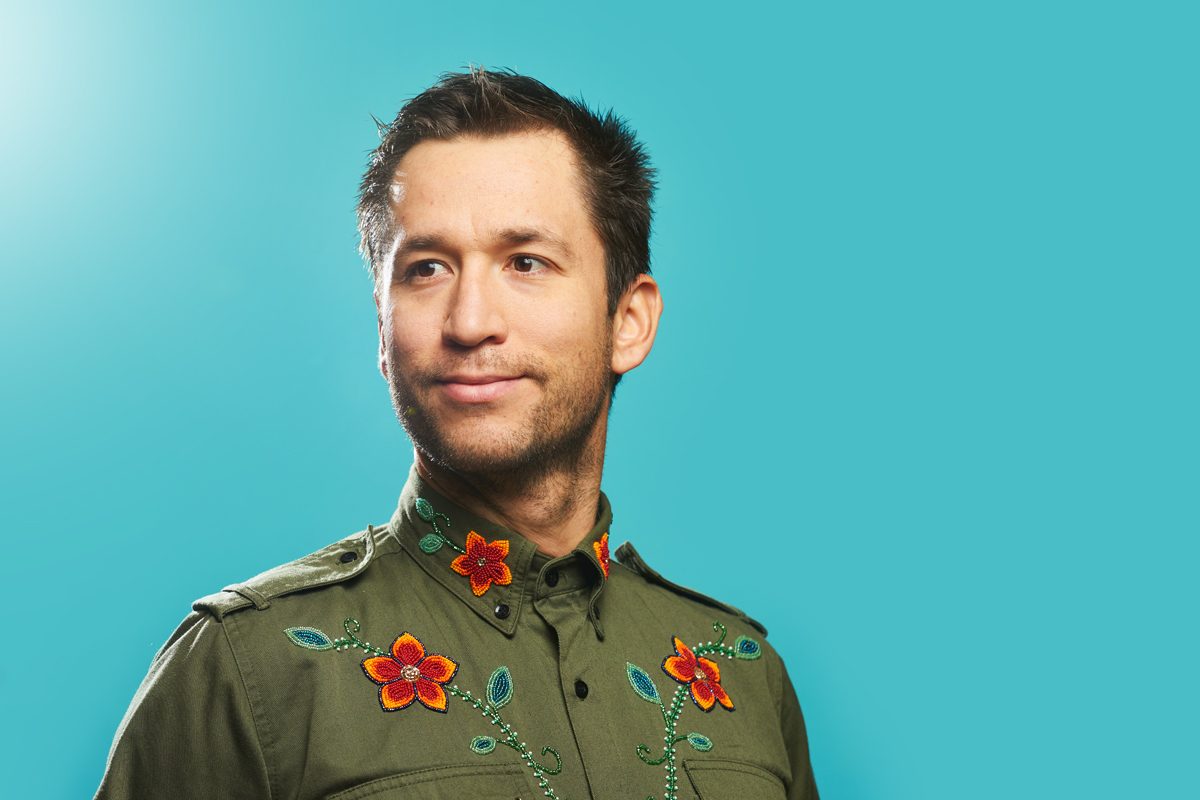
Indigenous Scholar Réal Carrière. Photo by David Lipnowski.
Centering Indigenous knowledges in politics and governance
Meet Indigenous Scholar Dr. Réal Carrière
Dr. Réal Carrière grew up on a traditional hunting and gathering territory called Mistapikmawak. Near Cumberland House on the Saskatchewan River in Treaty 5, the community is predominantly Nehinuwak (Swampy Cree) and Métis, and Carrière holds relations to both nations on his father’s side, and has German and English roots on his mother’s side. It was on these territories that he began his education in homeschooling, which centred the knowledges of the Nehinuwak and Métis people.
When it came time to enroll in university, Carrière said he did not have a clear idea of what he wanted to pursue.
“My mother asked me what I wanted to do and I told her I wanted to be an ‘Imagineer,’ or someone who imagined things,” he told UM Today. As a starting point, Carrière enrolled in an undergraduate general arts program at Simon Fraser University. By doing so, he was able to take a wide selection of courses, including a political science class. “The course was taught by an amazing professor whose teaching style ultimately influenced me to pursue a career in the field,” he recalled. “[The professor] made me want to be an innovative teacher.”
Leaving his home community for post-secondary proved to be difficult and lonely. “Going to Vancouver was quite a shock because it was such a big city and the weather was completely different from what I was used to,” he said. Carrière joined the First Nation Student Association on campus and cited it as a community that kept him grounded in otherwise very new territory. “They became my family and I still keep a connection with them to this day.”
After gaining a sense of political science, Carrière decided to blend his formal post-secondary knowledge with his childhood upbringing in Indigenous knowledges while obtaining his PhD through Ryerson University. “I became driven to protect Indigenous knowledges and utilized Indigenous methodologies in my research, and eventually, into my teaching,” he said.
Attracted to an institution that housed a large Indigenous student population, Carrière and his family relocated to Winnipeg and he began his teaching position in political studies in the University of Manitoba’s Faculty of Arts.
One of the ways that Indigenous methodologies plays out in Carrière’s teaching style is through exploring the foundation of Indigenous governing structures. Starting by dismantling the concept that Indigenous people are homogenous, Carrière works to unravel the dynamic worldviews in varying nations. “I do this to show students that Indigenous governance needs to be thought of as multiplicity governances,” he said. “Only when students see the diversity, do I start to look at how Indigenous governance has influenced and interacted with western governance.”
Carrière recently began exploring the different philosophical interpretations of Treaty 1 in the classroom. “Anishinaabe treaty philosophy views treaty as an agreement to cooperate and share, whereas western treaty philosophy viewed treaty as a land ownership transfer,” he noted.
Outside of the classroom, Carrière is an avid canoer. His interest in the sport has taken him all over North America, but his preference is canoeing around Manitoba. “I am always excited to attend canoe races in Manitoba because most of them are in Indigenous communities,” he said. Aside from that, he is busy writing a book for University of Toronto Press on Indigenous understanding, methodology and research paradigms, due for publication in May 2021. He is also the lead on a Social Sciences and Humanities Research Council (SSHRC) funded project called Nistotumowin Nehinuwak Okimahin: Developing a Deeper Understanding of Swampy Cree Political Theories and Practices – a project that centres Indigenous knowledges and their role in politics.
Most importantly, Carrière’s passion is based in creating a learning environment that explores the many layers of Indigenous politics. “I want Indigenous students to know that UM has Indigenous people teaching Indigenous politics,” he said. “I believe it is important for all Indigenous students to take the intro courses to Indigenous politics to learn about how they impact our daily lives.”






